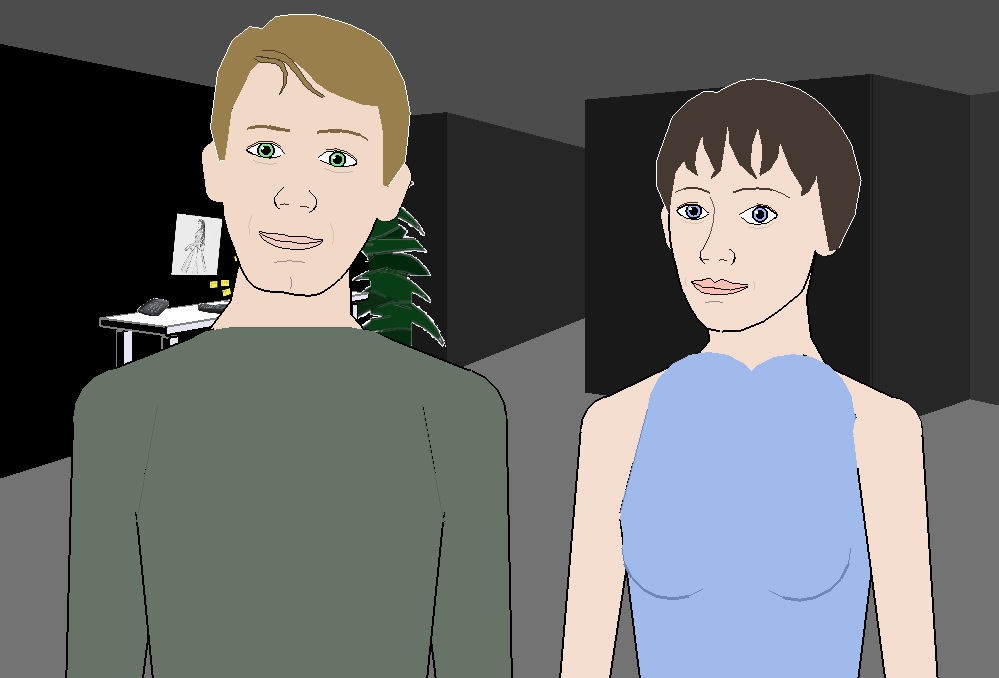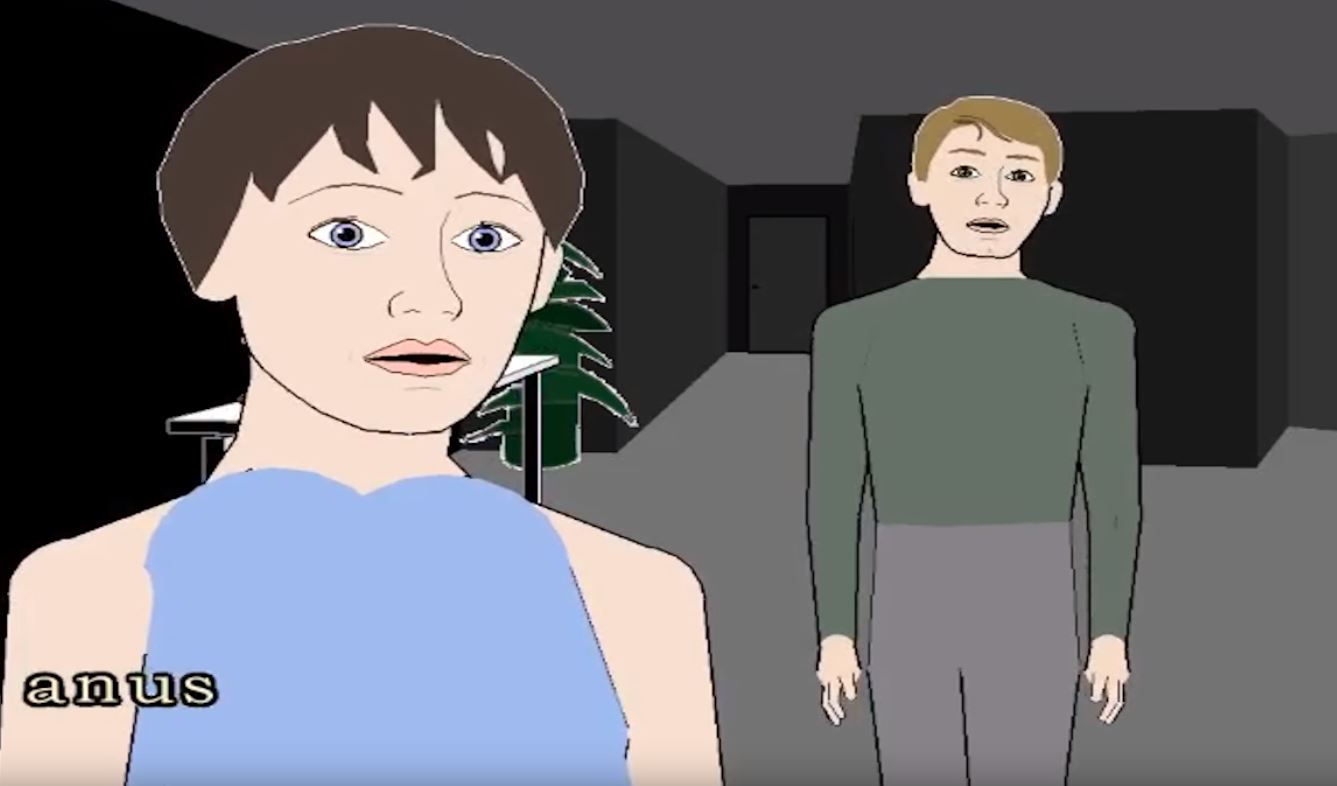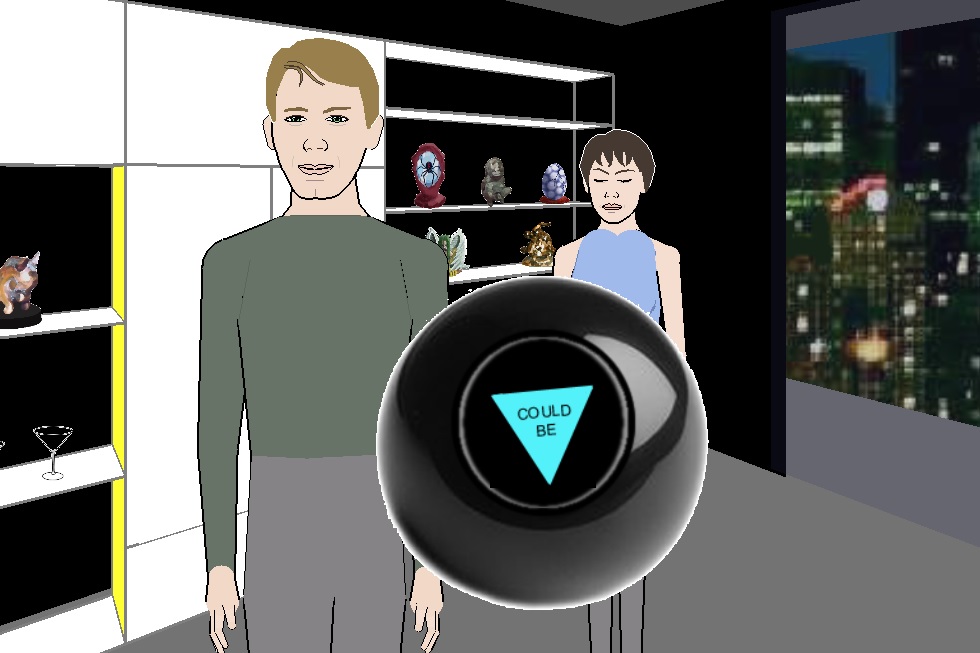Years later, Façade's groundbreaking AI lives on through bad YouTube jokes
A game once lauded for having the "emotional impact of great art" is now mostly forgotten—except by Youtubers.

We first published this story in February of 2018. Façade remains one of a kind today.
What would you put on the Mount Rushmore of Let's Play videogames? You know, the stuff that every YouTuber has happily mined for easy content? Amnesia: The Dark Descent is first, for sure. Those winding hallways and desiccated monstrosities inspired endless earbud-shattering scare compilations back in 2010. You'd also have to include Surgeon Simulator and Goat Simulator—the first and greatest of the tongue-in-cheek send-ups of hardcore PC sims. Façade might be the fourth.
More than a decade ago, Façade was heralded as the next big thing for videogames. Today, it's one of those games you may only recognize by the reams of garish thumbnails dotting the YouTube bedrock. Papier-mâché apartment, low-res jpegs sitting on the flimsy Ikea shelves, the infamous kiss function. Façade is about love, distance, and how difficult it is to authentically relate with other human beings. The YouTubers, of course, missed that memo.
Façade opens with you standing on the welcome mat of a New York loft that belongs to your thirtysomething married friends, Trip and Grace. You are here to drink wine, break bread, and enjoy that particular strain of surface-level familiarity that defines the vast majority of adult friendships. But then, something goes wrong. Tripp gets a phone call from his mother. The couple starts chirping at each other, resurrecting menial grudges left in the dark to metastasize without the necessary communication, and suddenly you're in the middle of an apocalyptic, end-of-the-relationship fight.
Designers Michael Mateas and Andrew Stern were both supremely interested in the malleability of artificial intelligence, and the potential to cultivate a gameplay structure that allowed the player to say whatever they wanted to a cast of characters that would react dynamically. It was a huge step forward from the flowcharts that define the dialogue trees in most RPGs and adventure games, especially considering Façade was originally released all the way back in 2005.
"We've always wanted to play a game that uses natural language, that offers players hundreds or even thousands of ways of expressing their own emotions and ideas," say Mateas and Stern, who I reached over email (they told me they'd like to answer my questions as a team). "Structurally and thematically, we wanted to make an anti-videogame. Instead of requiring dozens of hours of questing, object collection and leveling up, we desired a short but emotionally intense, tightly unified experience, focused on the entanglements of human relationships. In other words, we wanted to experience an interactive dramatic one-act play, akin to getting on stage with improv actors skilled enough to collaborate with you to make an interesting and meaningful drama happen in real-time."
If you play Façade as it was intended—by role-playing the experience as a concerned friend—their AI system holds up remarkably well. Tripp and Grace stay in-tune with your inputs. They get enthralled, angry, amused, and offended in the way that humans do, and the facial animation, while primitive, is emotive enough to get the job done. If you navigate the ebbs and flows of the conversation correctly, you might temporarily mediate their issues and convince the couple to give things another chance. Or you might fuck up and say the wrong thing, and have Tripp angrily escort you out of the apartment.
Keep up to date with the most important stories and the best deals, as picked by the PC Gamer team.
The thing about Façade is that its reliance on genuine interaction with the AI makes it ripe for abuse.
Façade was released to a pre-Steam world. Mateas and Stern wanted to get as many eyes on it as possible, so they released it as a free download and accepted small, personal donations to recoup the costs. But after bringing their project to a few showcases, Façade hit the stratosphere. It is perhaps the earliest example of an indie game receiving the type of prestige acclaim doled out by mainstream media institutions like the New York Times, who wrote a piece with the hilariously out-of-touch headline, "Redefining the Power of the Gamer."
In 2006 Façade was christened by the Slamdance Independent Games Festival with their Grand Jury Prize, and that same year it served as the central motif for a glossy Atlantic feature. The closest analogue I can think of is Myst—the first real example of games-as-art self-seriousness—which single-handedly changed the definition of interactive entertainment for a ton of suspicious baby boomers. Façade might not be that influential, but it certainly earned its keep.
"We aimed for the stars, hoping to hit the moon, and we think we at least got into orbit," says Stern and Mateas.
I'm not exactly sure who first pioneered Façade's strange second coming as an internet meme, but like most things in the swirl of YouTube screeching, it's probably PewDiePie. His first Façade video racked up a massive 7 million views, with guys like JackSepticEye and The Gaming Lemon not far behind. How did they manage to find comedy in a fairly solemn experience? Well, the thing about Façade is that its reliance on genuine interaction with the AI makes it ripe for abuse.

You can be a hilariously awful house guest in Façade. You can eagerly insult, dismiss, and belittle Trip and Grace; you can interrupt a heated exchange, as The Gaming Lemon does, by saying "I need to shit;" you can kiss Trip right on the lips as soon as he opens the door. These videos do not give Façade the benefit of the doubt, nor do they cache their vulgarity in any plausible deniability. Instead, they fill the chat log with as many rude words as possible until the premise snaps in half.
To be clear, there are things about Façade that are intentionally tongue-in-cheek. There is a magic eight-ball in the corner of the apartment that you can consult for randomized advice, and the very fact that Trip and Grace will respond to some of your more outlandish queries seems designed for some good old-fashioned videogame mischief. Still, it's funny that this deeply impressive piece of software, that has been showered with the crossover glory this industry so rarely gets, has devolved into a meme.
Thankfully, Stern and Mateas are totally fine with Façade's newfound reputation. They created a playpen—a microscopic universe where things go wrong over and over again—and they knew full well that the internet was going to try to see the boundaries.
"It's a wonderful surprise that Façade has been such a good fit for streamers, but it makes sense, for a couple of reasons," they say. "Façade's open-ended language interface allows players to say anything they want, so players with comedy and improv dialog skills can show off their talent directly in the game, and make forward story progress. Dramatically Grace and Trip 'play it straight' so to speak, doing their best to support and work with the player's antics, allowing the player to play the role of the wacky insane friend, which is entertaining to watch."

A lot of those Façade videos are super funny. It's hilarious to watch Trip and Grace struggle to parse the inane barrages of their guests, while still trying to keep things in line with the overarching narrative. But honestly, if you watch enough, you'll feel disappointed that the rest of the industry has yet to try something this crazy again.
Façade is an old game, but I can't think of one since that's really allowed us interact with their AI on our own terms—with no safeguards or restrictions protecting us from mayhem. Sure, I can understand why BioWare might prefer a design where their players can't intrude on a key story beat by announcing a bowel movement, but there's a vast opportunity in character AI still left unexplored.
Façade was a vision of the future, and it still seems pretty far away, but no matter its legacy, Façade will always be one of a kind.

Luke Winkie is a freelance journalist and contributor to many publications, including PC Gamer, The New York Times, Gawker, Slate, and Mel Magazine. In between bouts of writing about Hearthstone, World of Warcraft and Twitch culture here on PC Gamer, Luke also publishes the newsletter On Posting. As a self-described "chronic poster," Luke has "spent hours deep-scrolling through surreptitious Likes tabs to uncover the root of intra-publication beef and broken down quote-tweet animosity like it’s Super Bowl tape." When he graduated from journalism school, he had no idea how bad it was going to get.

